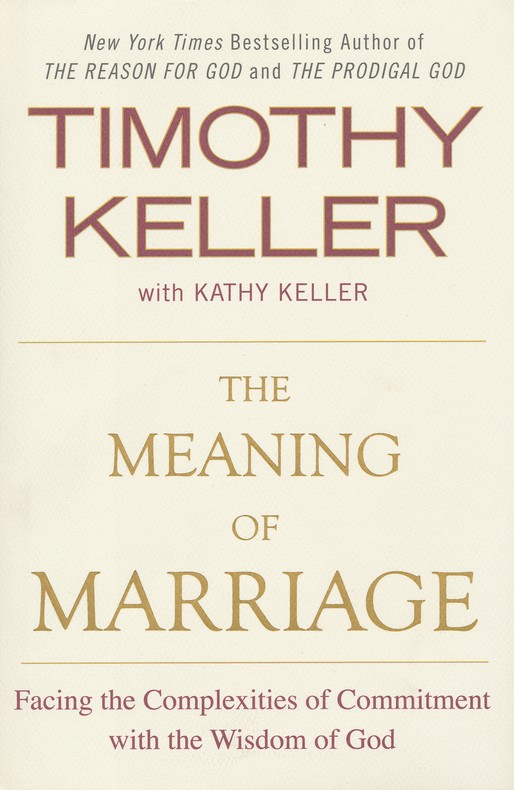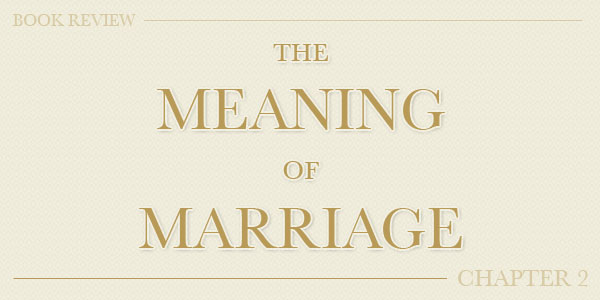Chapter 2 – The Power for Marriage
Every marriage faces challenges. This chapter explains why we face challenges and how to get through them without experiencing damage to the relationship. Keller opens with a passage of scripture:
“Submit to one another out of reverence for Christ.” – Ephesians 5:21
A person who submits to another out of reverence for Christ is filled with the Holy Spirit. The Holy Spirit is what empowers that person to humbly serve another. The power for marriage is the power of the Holy Spirit working within one’s life. Keller explains on page 51, “Only if you have learned to serve others by the power of the Holy Spirit will you have the power to face the challenges of marriage.”
God’s Holy Spirit is active, radically changing us at our core; helping us to understand the truths about Jesus, transforming us to be more like Him.
Husbands and wives are called to submit to each other, and to consider one another better then themselves. (Phil. 2:2-3) It is difficult to do this because our sinful nature is selfish, however with the Holy Spirit empowering us we can serve our spouse better. Keller states on page 53:
“Whether we are husband or wife, we are not to live for ourselves but for the other. And that is the hardest, yet single most important function of being a husband or a wife in marriage.”
When given the opportunity to serve your spouse there are three responses you can have: “You can offer to serve the other with joy, you can make the offer with coldness or resentment, or you can selfishly insist on your own way. Only when both partners are regularly responding to one another in the first way will the marriage thrive.” (54)
The problem for most marriages is self-centeredness. Today’s culture finds the idea of placing your spouse’s interests above your own… oppressive.  This viewpoint is an enemy to marriage, and a catalyst for conflict. Self-centeredness makes you blind to your own faults while being “hypersensitive, offended, and angered by that of others. The result is always a downward spiral into self-pity, anger, and despair, as the relationship gets eaten away to nothing.” (Page 57) As I read these words by Keller, I began to understand the affects of my own self-centeredness in my marriage. I can identify with those feelings when I get offended by what I think is my husband’s self-centeredness, never evaluating my own. This was a great eye-opener for me; I hope that I can be more aware of my own self-centeredness and work on lessening it.
This viewpoint is an enemy to marriage, and a catalyst for conflict. Self-centeredness makes you blind to your own faults while being “hypersensitive, offended, and angered by that of others. The result is always a downward spiral into self-pity, anger, and despair, as the relationship gets eaten away to nothing.” (Page 57) As I read these words by Keller, I began to understand the affects of my own self-centeredness in my marriage. I can identify with those feelings when I get offended by what I think is my husband’s self-centeredness, never evaluating my own. This was a great eye-opener for me; I hope that I can be more aware of my own self-centeredness and work on lessening it.
On the very next page Keller informs us that, “The Spirit’s work of making the gospel real to the heart weakens the self-centeredness in the soul.” (58) So as we draw close to God and allow His Holy Spirit to work in our lives, the less self-centered we become and the more we are able to serve our spouse with joy. Perhaps in those moments when your marriage is struggling, stop to evaluate your relationship with God. For me personally, if I notice I have a poor attitude or act out in selfishness, it is often the result of NOT spending time with God.
There is a great section called “The Wounds We Carry” which explains why it is difficult for us to see our own self-centeredness, one of those reasons being our own history of mistreatment. Many people experience serious hurt growing up, whether it is emotional abuse, verbal abuse, or physical abuse. “Woundedness is compounded self-doubt and guilt, resentment and disillusionment.” (61) Then as people enter into a relationship that results in marriage, the affects of the wounds carried enter with them, which is dangerous in marriage. For example, if a husband and wife have a conflict about something, their memories of past experiences can sabotage them. We who are self-centered assume our needs are more important over another’s because of what we have been through in life. Yet, with that kind of an attitude in marriage a husband or wife will be miserable.
We need to confront our self-centeredness. Our self-centeredness is a byproduct of our sinful nature; it wasn’t caused by those who hurt us, it merely was aggravated by the abuse endured. We need to so something about it or else we will remain in misery, and so will our spouse.

Marriage often reveals how selfish the wonderful person you married really is and it reveals how selfish you really are. Woundedness makes us minimize our own selfishness. (64) It is important that we evaluate our own selfishness as a root problem in marriage and treat it more seriously than our spouse’s selfishness, because we are the only ones with complete access and responsibility for our own selfishness. (65) When people understand the gospel and can admit their own selfishness and work on it, they experience a freedom or sense of liberation, as well as the ability to serve others with joy.
Referring back to the verse Ephesians 5:21, a husband and wife submit to each other out of reverence or fear of Christ. As the Holy Spirit reveals the truth about Christ and the gospel to each of us, we are empowered to serve others. However, we still must remain aware of self-centeredness and what motivates our decisions.
Does success motivate you, wealth, or respect?
Do you only do something if it benefits YOU?
“Paul says that if any of these things is a greater controlling influence on you than the reality of God’s love for you, you will not be in a position to serve others unselfishly.” (68)
There is an awesome testimony mentioned of World War II hero Louis Zamperini. Captured as a prisoner of war in 1943, he was constantly beaten, humiliated, and tortured for 2 ½ years. When he returned home to his wife, he suffered post-traumatic stress disorder. Keller recounts Zamperini’s struggle with alcohol and his violent abuse towards his wife, ruining years of marriage. The victory in the testimony is when Zamperini gave his life to Christ and was healed of the bitterness and resentment he harbored against his attackers. This powerful testimony filled me with hope, not only for my own marriage, but for other marriages I know to be going through a tough season. The power of marriage, where a husband and wife respect and love each other, truly lies in the power of the Holy Spirit and the couple’s willingness to submit to Christ and to each other, with selfless hearts.
Keller writes, “Until God has the proper place in my life, I will always be complaining that my spouse is not loving me well enough, not respecting me enough, not supporting me enough.” I believe this is true for everyone. I admit I have thought those exact things before, when I should have been evaluating whether I was loving my husband enough, respecting him enough, supporting him enough. It is critical to our marriages that God has first priority in our lives, and that we are willing to joyfully submit to and serve our spouse.
GET The Meaning Of Marriage: Facing The Complexities Of Commitment With The Wisdom Of God HERE

